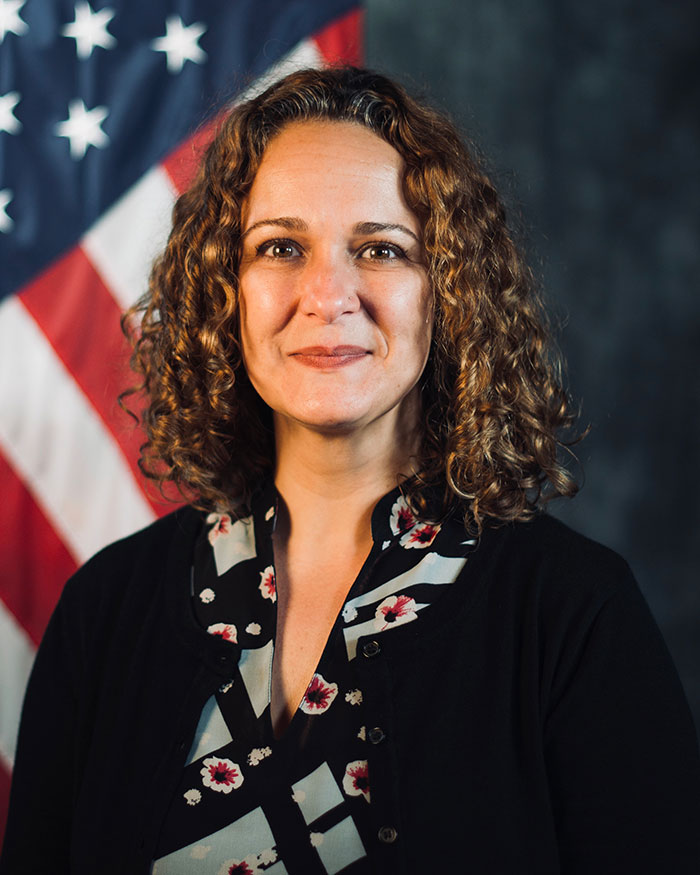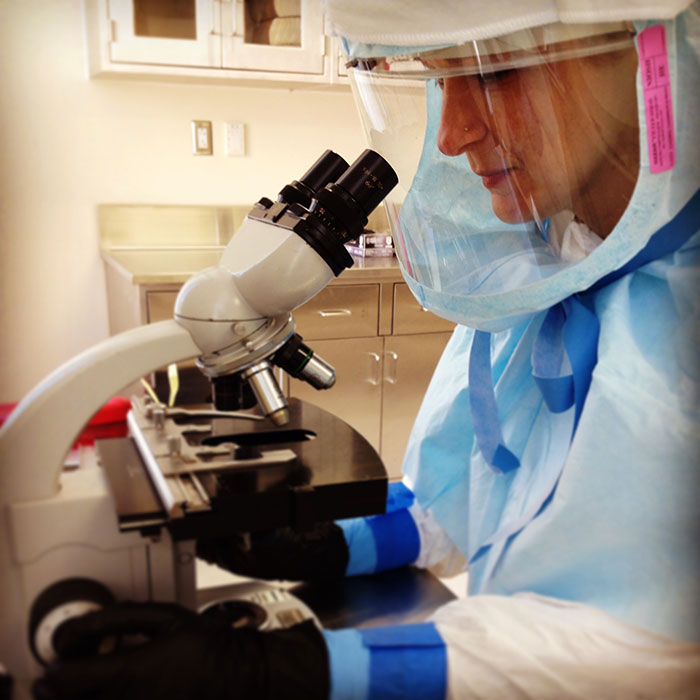Cowboy Code Keeps Lawson Primed for Biorisk Success
This article represents the latest in a series of personal interest stories designed to spotlight notable people, stories and achievements across the U.S. Army Medical Research and Development Command. If you would like to recommend a specific Soldier or civilian employee for this series, please contact Ramin A. Khalili, USAMRDC Public Affairs Office Writer, at ramin.a.khalili.ctr@health.mil
When Dr. Cristine Lawson is having a tough day — when she's digging for answers to any number of complex questions inside the U.S. Department of Defense Biological Select Agents and Toxins Biorisk Program Office at Fort Detrick — she finds herself reaching for one source of inspiration more than any other; a book that provides the motivation required to operate in one of the busiest, most risky, and most technologically-dense fields around.
The name of that book? Cowboy Ethics: What Wall Street Can Learn From the Code of the West.
"You need to have courage to do the work that we do — you have to take pride in it," says Lawson, the Deputy Director for Biosecurity of the BBPO, noting that the seemingly disparate worlds of modern biosafety and biosecurity (biorisk) and the so-called "Old American West" have more in common than one might think. "Believe it or not, all of the concepts discussed in that book are so applicable to what we do and how we should be as professionals."
It's hard to argue with her assessment, especially given the results. After serving as the Associate Biological Safety Officer at the National Institutes of Health National Institute of Allergy and Infectious Diseases Integrated Research Facility for several years, Lawson arrived at Fort Detrick in 2017 to help the BBPO accomplish its vision of bolstering biological defense measures by addressing key biological threats and minimizing their potential impact. The BBPO supports the U.S. Army Medical Research and Development Command chiefly as a byproduct of the Command's key "executive agent" responsibility over all biosafety and biosecurity programs across the entire DOD. It was during her time as a postdoctoral fellow with the National Biosafety and Biocontainment Training Program at the NIH that Lawson, while attending a professional development class with world-renowned biosafety expert Bob Ellis at Colorado State University, was gifted Cowboy Ethics in the first place — a text that has, with its mix of simple, homespun advice, guided her general professional outlook in large part.
"I am a strong believer that if you take a job, you ride for that brand," says Lawson, paraphrasing lesson number seven from the book — a nod to the specific trademark or logo of a given ranch. "Cowboys always have to ride for their brand, they have to believe in what they do and they have to believe in that brand."
With that in mind — and in typical rugged ranch-hand fashion — Lawson has made her mark of late by tackling a number of thorny tasks all at once, notably juggling a variety of pandemic-required changes to laboratory operations, regulations and day-to-day output. Those efforts rest on top of her ongoing work with the larger interagency community to help develop answers and relevant responses to the enduring threat of the novel coronavirus at both the community and national level. One such project involves efforts to develop methods by which to decontaminate personal protective equipment so that it can be re-used — and then standardize that process for use in hospitals and laboratories nationwide.
Interestingly enough, however, it is Dr. Lawson's work with another notable text that has earned her considerable praise. Her efforts to help revise and update the recent (6th) edition of Biosafety in Microbiological and Biomedical Laboratories (BMBL) — a massive text that's long been considered a cornerstone document in the biosafety world as it sets, in essence, the standards for all biosafety practice in the U.S. — was viewed by coworkers as an accomplishment above and beyond even the highest expectations.
"[Dr. Lawson's] recent accomplishment as part of the team that brought the BMBL to publication speaks directly to her knowledge and ability for effective communication," says Mary Chizmar, the BBPO Emergency Management Specialist who works closely with Lawson. "She is requested across the community, in both Federal and private industry, to speak about a variety of subjects in biorisk. She has an amazing way of simplifying complex issues and challenges into manageable tasks."
Chizmar further notes that Lawson is known office-wide for using her personal time to develop lesson plans designed to teach non-laboratory personnel about the nuances of BSAT requirements. It's a selfless act — one of many — that speaks to both character and work ethic.
"She incorporates what she's learned from others and uses that information to improve," says Chizmar. "[To] improve our mission, to improve her understanding of roles and responsibilities of others, and how that all contributes to the betterment and collective understanding in the biorisk community."
Says Lawson, "I believe in the very important work that the DOD does, especially when it comes to research with not just what we focus on — which is biological select agents and toxins — because that research has an impact on protecting our troops, and our nation."
Indeed, that kind of dedication echoes cowboy rule number two ("Take Pride in Your Work") but could also fit in nicely among the other tenets as well. It's an impressive adaptation when you think about it: the self-described "city girl" who grew up in Rio de Janeiro, Brazil (and who freely admits to never having seen an actual cow until she was in her twenties) relying on professional advice gleaned from the wide-open landscapes of the American southwest. Lucky then for the USAMRDC that Dr. Lawson holds cowboy rule number three ("Always Finish What You Start") as one of her favorites, as — in a field of burgeoning interest, importance and possibility — her skills will no doubt play an integral role in the future of the Command's contributions to the DOD and, by extension, the nation.
"It comes down to this — you have to be humble enough to know that you can learn from people in all walks of life," says Lawson, offering her own personal take on both life and professionalism. "We always have to be ready to make sure the Mission is moving forward."
 An official website of the United States government
An official website of the United States government
 ) or https:// means you've safely connected to the .mil website. Share sensitive information only on official, secure websites.
) or https:// means you've safely connected to the .mil website. Share sensitive information only on official, secure websites.




